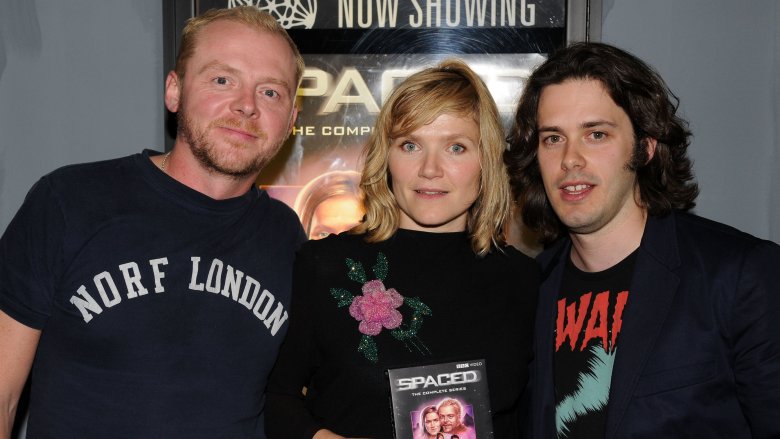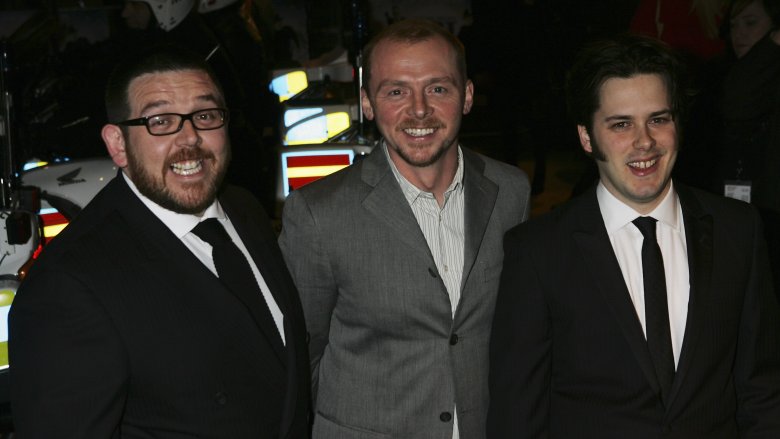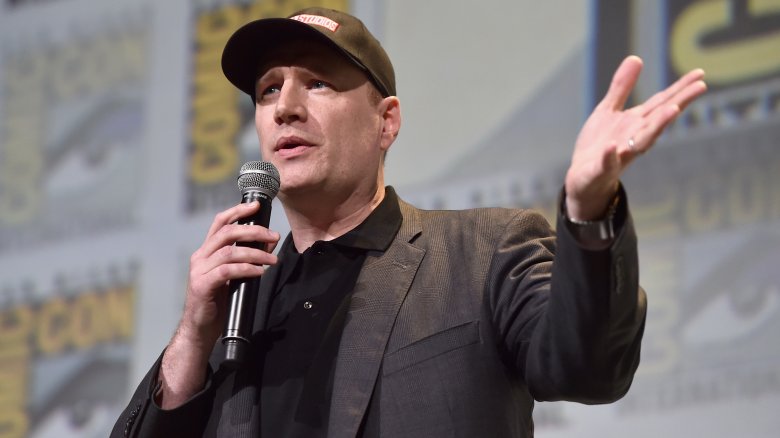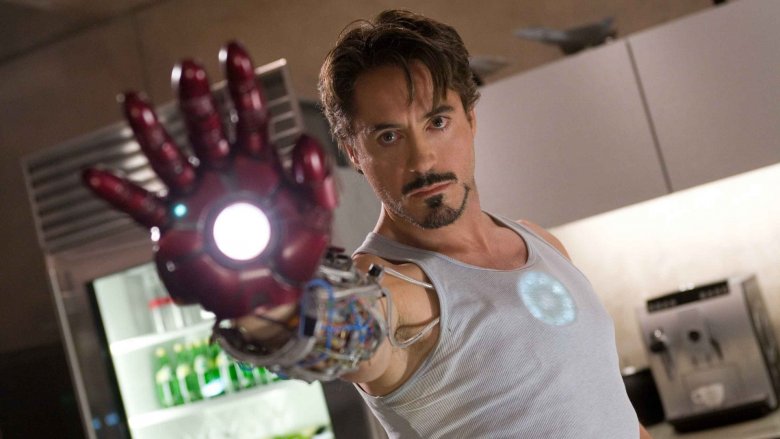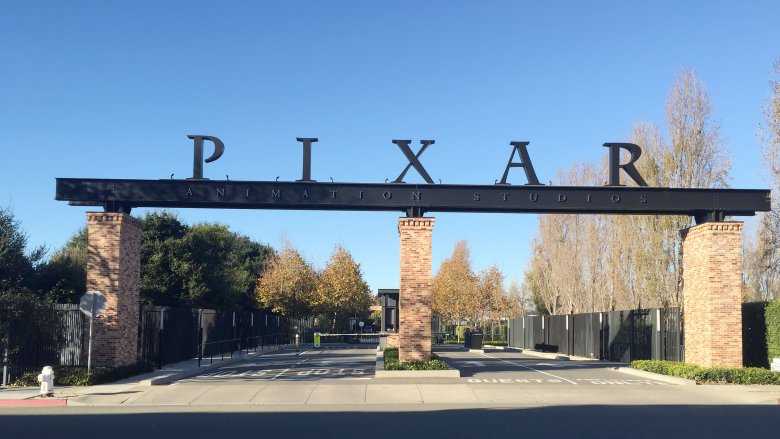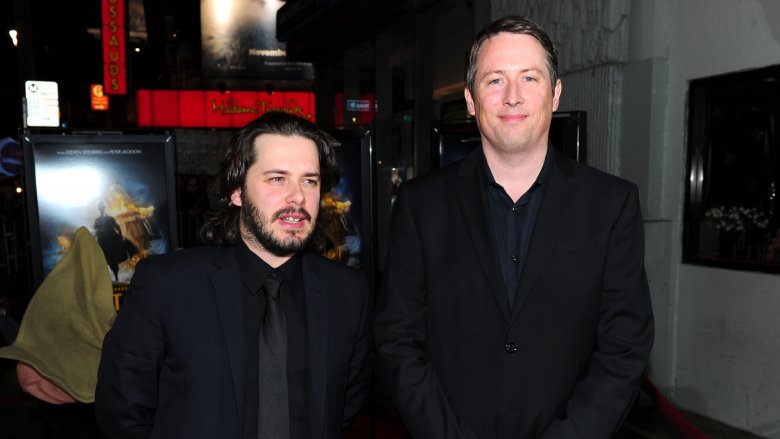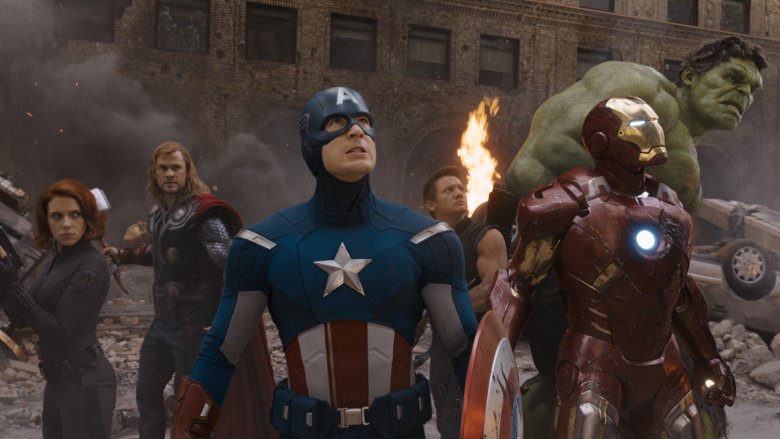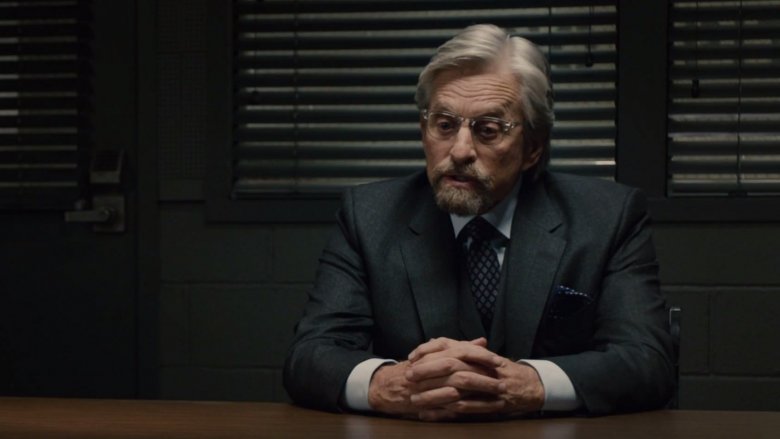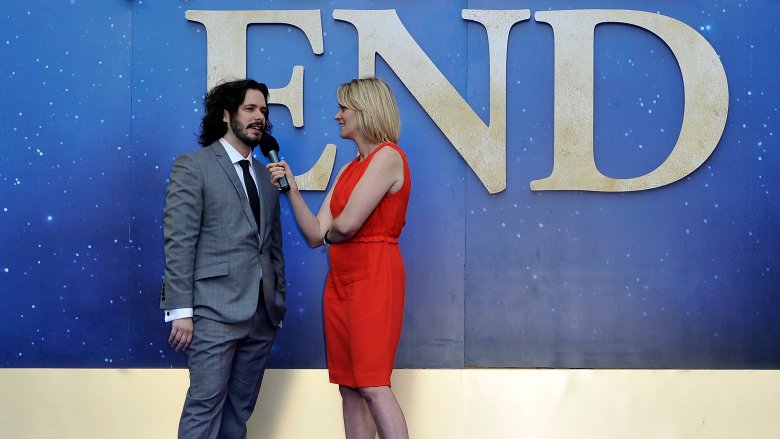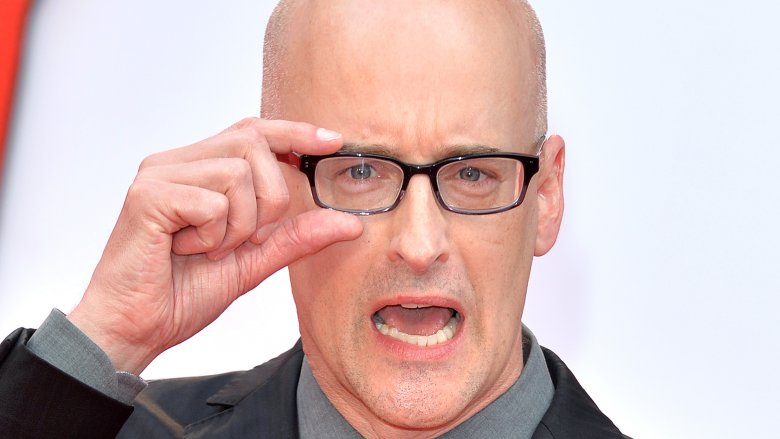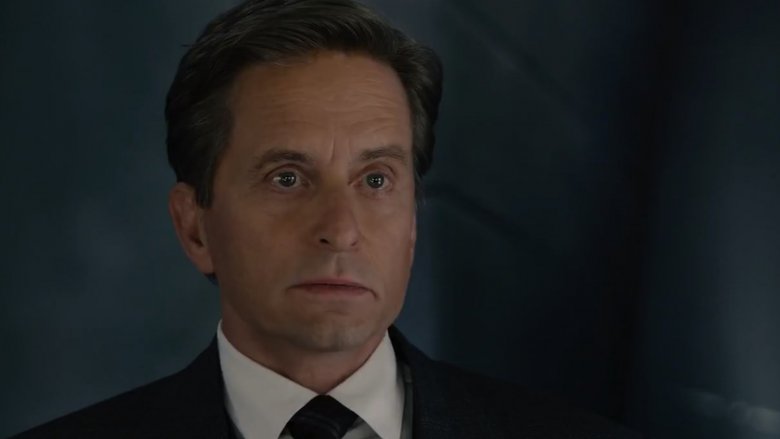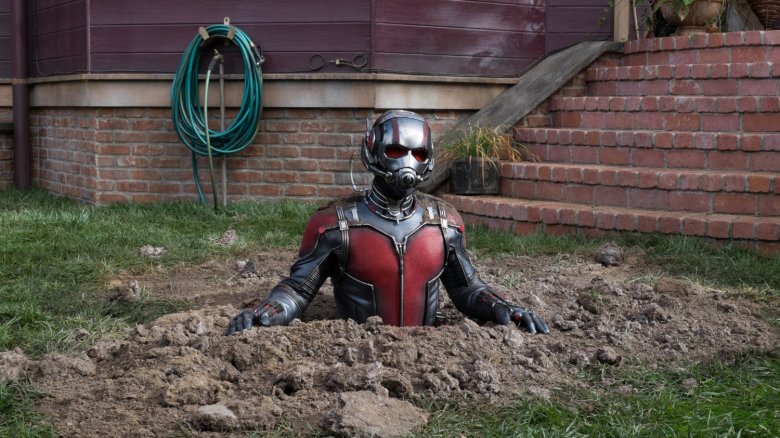Why Ant-Man Almost Didn't Happen
Ant-Man turned out to be a fun Marvel movie that proved Paul Rudd not only doesn't age, but that he also makes an excellent superhero. With its mix of comedy and action, the film fit well in the Marvel Cinematic Universe (MCU), while adding its own little quirks along the way. But getting Ant-Man to the screen was an arduous task around 15 years in the making, and as it turns out, our favorite shrinking man almost never made it to movie theaters.
Edgar Wright's initial pitch
Best known for directing the Three Flavours Cornetto Trilogy and Scott Pilgrim vs. the World, Edgar Wright was involved with Ant-Man from the very beginning. In fact, before Iron Man proved that Marvel Studios had legs, the comic company was talking to Wright about bringing the pint-sized hero to life.
In the '90s, Marvel sold off a bunch of character rights to stave off the company's monetary difficulties. Artisan swooped them up, but after the production company's success started to wane, they merged with Marvel in 2000. This was the very beginning of Marvel Studios.
Then, in 2001, Wright had finished working on Spaced, a British TV comedy starring Simon Pegg and Nick Frost. With the series over, Wright pitched an Ant-Man movie to Artisan. The plot revolved around Scott Lang swiping the Ant-Man suit from its creator, but the studio turned him down. Evidently, they felt the heist-heavy film wasn't right for the more family-oriented audience they were going for. However, Wright believes that Artisan never even shared the pitch with Marvel, but soon, the comic company would return to Wright with a proposition.
Marvel wrights a wrong
By 2004, the status of Marvel Studios and Edgar Wright had changed. Wright was no longer just a BBC favorite, but had gained huge popularity after helming Shaun of the Dead and was working on Hot Fuzz. Marvel, on the other hand, still hadn't put out their own film, but they had put Kevin Feige in charge.
According to Luke Owen at Flickering Myth, Wright was promoting Hot Fuzz at the San Diego Comic-Con when Feige asked him if he'd like to do a Marvel project. Wright explained that he'd already been rejected by Marvel, but Feige and Wright had a meeting anyway to talk about their ideas for Ant-Man. In less than a year, Wright submitted a new pitch with his writing partner Joe Cornish for the superhero film, and all signs pointed to a big "yes" for a Wright/Marvel collaboration.
Ant-Man is officially announced
In 2005, Marvel announced it was changing it's name to Marvel Entertainment Inc. and planning to make its own superhero films. The company said that ten films would be coming down the line, using characters such as Captain America, the Avengers, Nick Fury, Black Panther, Ant-Man, Dr. Strange, and Hawkeye, among others.
While this all seemed good for a potential Ant-Man film, there was one more key bit of info about the new Marvel strategy. Kevin Feige (pictured above) decided that all the films and characters would be part of the same world, thereby creating the Marvel Cinematic Universe we all know so well. Then in 2006, Marvel and Wright began developing their upcoming project, although things started hitting snags pretty quickly, with Wright saying in 2007, "Ant-Man is in a bit of a holding pattern. We're figuring things out with the script, and we haven't initiated casting. We still have quite a bit to do."
Iron Man establishes the universe
In 2008, Iron Man soared into theaters and gave Marvel a monster hit. Knowing that Marvel Studios wasn't about to fade into obscurity, fans finally got some updates about their other favorite characters. In June 2008, Wright was in the process of filming Scott Pilgrim vs. the World, but publicly stated that he was working on the second draft of Ant-Man. At the time, it looked like Marvel wanted an Ant-Man movie by 2010, and that they would include the character in the first Avengers film.
Wright still referred to the film as something a little more off the beaten path. He explained that he didn't want to create a cliched origin story, saying, "So it's definitely a Marvel film, but it's got a little twist on it in terms of the way that it plays out." Wright also told fans to expect "more of a full-on action adventure sci-fi film but with a comedic element." However, fans were still guessing which Ant-Man might show up inside the suit. Would it be Scott Lang, Hank Pym, or Eric O'Grady? There was plenty of speculation until Wright finally told Empire, "Ah well, it could be Scott Lang, it could be Hank Pym, it could be both–okay it is both, now there's an exclusive for you."
The Pixar rumors
By 2009, no one had heard any new updates about Ant-Man for a while, and speculation was running rampant. It didn't help any when Wright announced that after he finished Scott Pilgrim, his next film might be Baby Driver. Now, it seemed like there was no reliable timeline for getting Ant-Man off the ground.
Ant-Man was so up in the air that after Disney bought Marvel, there were rumors Pixar might take over the film's development. According to Screen Rant, Pixar allegedly felt Ant-Man would be a good fit for the company, and people speculated that with all of Marvel's success, they'd want to increase production by possibly getting other Disney studios to do some of the work.
Basically, 2009 was the year of incorrect information about Ant-Man. At the time it was believed that Ant-Man would appear in The Avengers, that the solo movie wouldn't feature any other Avengers characters, and it would be an Edgar Wright comedy. And things would only get more confusing as time went on.
Working on the script again
In February 2010, Edgar Wright admitted that he'd spent the last several months focusing exclusively on Scott Pilgrim vs. the World. However, now that he'd finished his Michael Cera flick, he was finally ready to give Ant-Man the attention it deserved. Still, according to the Los Angeles Times, Wright wouldn't start working on the script again until January 2011. The director also stressed that Ant-Man didn't have a release date, and that he and Feige just wanted to make a good script that could stand alone and work more as a "great genre film" than a typical superhero origin story.
Then in July 2011, Wright announced at the San Diego Comic-Con that he and Joe Cornish (pictured right) had recently submitted a third draft of the script to Marvel. Talking with MTV News, Wright said that Ant-Man would be a film for people who "don't have to know 50 years of Avengers history to enjoy the movie." Even though the project had hit so many road bumps, things were starting to sound promising again, but as the MCU grew bigger and bigger, Kevin Feige began changing his plans about Scott Lang's future.
Fitting in with the MCU
By Comic-Con of 2012, everything was coming up roses for Ant-Man. It was officially announced that Edgar Wright would direct, and he shared some test footage to give the fans a taste of the new hero. The footage looked great, and people were excited that Ant-Man was made into badass without losing his humor.
But all these good times wouldn't last. Wright already planned to direct The World's End before fully committing to Ant-Man, so that meant the little hero would have to wait a bit longer. And then, Feige threw a wrench in the works. After The Avengers became an insane mega-hit, it was decided that Marvel wouldn't have any real standalone films. This was a real problem for Ant-Man since Wright had publicly stated for years that his film would in no way connect with any other characters.
In other words, that meant Scott Lang was getting another re-write.
Production finally begins...sort of
Finally in 2013, pre-production began in earnest for Ant-Man. Originally, the film was going to be shot in England, but after some issues, Wright was forced to work in the US. In October, Wright tweeted a picture of a man on set wearing an Ant-Man suit, assuring fans the movie really was happening this time. Better still, in January 2014, Marvel officially announced that both Paul Rudd and Michael Douglas had been cast as the leads, giving real hope to expectant Ant-Man fans.
Of course, the problems weren't over yet. A release date of July 2015 was announced, but Feige needed a fifth draft from Wright and Cornish. The director and the president of Marvel still weren't seeing eye-to-eye, and now the clock was really ticking. After all, Wright had written a scene to introduce Ant-Man after the credits of Avengers: Age of Ultron, but he still wasn't sure how his insect hero would turn out in his solo film.
Wright and Marvel part ways
Apparently, the fifth draft of Ant-Man still wasn't to Feige's liking. So in April 2014, the producer informed Wright that he needed another draft of the screenplay, only this time, Feige didn't want Wright's help. Wright wasn't thrilled that he was being sidelined, but decided to wait and see what this new draft was like before making any decisions about his future with the project.
And then, when Feige's draft finally came in, Wright read it and quit the next day.
After dropping out, Wright tweeted a photo of a sad looking Buster Keaton holding a photoshopped Cornetto. The photo was captioned "Selfie," and the tweet caused controversy since Keaton famously said that giving up his independent status to work with major studio MGM was the "worst mistake of my career." Wright quickly deleted the tweet, but like all things on the internet, everyone saw it anyway. In response, Joss Whedon tweeted a pic of himself holding a Cornetto in salute and later said that Wright's Ant-Man script was the best and "most Marvel" script he'd ever read.
Peyton Reed gets the job
Despite Wright's hasty exit, Marvel claimed the movie would still be released in July 2015. That meant they needed a new director right away. Initially, errant reports said that Adam McKay (Anchorman, The Big Short) was attached, but McKay quickly stated he wasn't available. Rawson Marshall Thurber (Dodgeball, Central Intelligence) and Ruben Fleischer (Zombieland) were in the mix until Marvel finally settled on Peyton Reed of The Break-Up and Bring It On. As for the screenplay, Reed and McKay would team up for rewrites, and after years of countless delays, Ant-Man would finally start filming for real.
A last-minute change
Perhaps the biggest question about Ant-Man is how much of the film is a result of Wright's vision as opposed to Reed's. While we don't which of Wright's ideas were removed from the movie, we do know the filmmaker had quite an impact on the final cut. The basic storyline, choice of characters, and cast were all Wright, whereas the score was entirely Reed's selection. Corey Stoll and Evangeline Lilly both said that their parts got a little bigger after Wright left the project, but Reed's main contributions were the concept of the Quantum Realm, the Falcon/Ant-Man fight scene, and the hilarious montage sequences featuring Michael Peña.
But even Reed's version of the film needed an extra cut right before release. Reed shot an opening sequence set in Panama where Hank Pym (though you're not quite aware it's him) does a full action sequence to steal some microfiche from an oppressive dictator. But after editing the film, Reed thought the scene felt too different from the rest of the movie, and the segment was replaced with the '80s flashback of a "young" Michael Douglas leaving S.H.I.E.L.D.
The film was a modest success
After the many years of development and drama, Ant-Man made it to theaters by its release date of July 17, 2015. As for the reviews, they were mostly good but not glowing. Most critics agreed the film was a solid superhero flick but not anything particularly special. Still, the film was a hit, eventually grossing more than half a billion dollars worldwide. However, in Marvel terms, it was only a moderate success. In fact, it was the lowest grossing Phase 2 film, and the "risky" Guardians of the Galaxy beat out Ant-Man's box office returns.
As for whether or not the film would've been better or worse with Edgar Wright's vision, well, it seems we'll never know. But considering how long it took for the film to make it to the big screen, the fact that Ant-Man came out at all and remained a funny and engaging addition to the Marvel Cinematic Universe is a little miracle.

